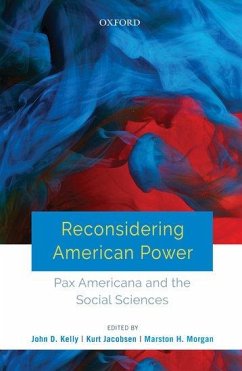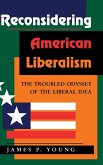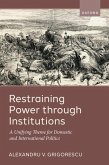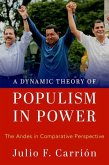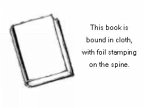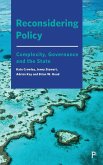Reconsidering American Power
Pax Americana and the Social Sciences
Herausgeber: Kelly, John D; Morgan, Marston H; Jacobsen, Kurt
Reconsidering American Power
Pax Americana and the Social Sciences
Herausgeber: Kelly, John D; Morgan, Marston H; Jacobsen, Kurt
- Gebundenes Buch
- Merkliste
- Auf die Merkliste
- Bewerten Bewerten
- Teilen
- Produkt teilen
- Produkterinnerung
- Produkterinnerung
Reconsidering American Power offers trenchant studies by renowned scholars who reassess the role of the social sciences in the construction and upkeep of the Pax Americana. The thematic image for this enterprise is the 'fiery hunt' for Ahab's whale, which focuses attention on the strange brew of mixed motives for American ventures abroad. The reach of Pax Americana exceeds its grasp, but this verdict requires deeper insight than simply flushing out cultural premises and conceptual limits. The volume's purpose is to understand the USA's 'fiery hunt,' and thereby to help to end it.
Andere Kunden interessierten sich auch für
![Reconsidering American Liberalism Reconsidering American Liberalism]() James YoungReconsidering American Liberalism205,99 €
James YoungReconsidering American Liberalism205,99 €![Reconsidering the East Asian Peace Reconsidering the East Asian Peace]() Reconsidering the East Asian Peace159,99 €
Reconsidering the East Asian Peace159,99 €![The Catholic Church and European State Formation, AD 1000-1500 The Catholic Church and European State Formation, AD 1000-1500]() Jørgen MøllerThe Catholic Church and European State Formation, AD 1000-1500116,99 €
Jørgen MøllerThe Catholic Church and European State Formation, AD 1000-1500116,99 €![Restraining Power Through Institutions Restraining Power Through Institutions]() Alexandru V GrigorescuRestraining Power Through Institutions131,99 €
Alexandru V GrigorescuRestraining Power Through Institutions131,99 €![A Dynamic Theory of Populism in Power A Dynamic Theory of Populism in Power]() Julio F CarriónA Dynamic Theory of Populism in Power116,99 €
Julio F CarriónA Dynamic Theory of Populism in Power116,99 €![New Directions for International Relations New Directions for International Relations]() New Directions for International Relations154,99 €
New Directions for International Relations154,99 €![Reconsidering Policy Reconsidering Policy]() Kate CrowleyReconsidering Policy114,99 €
Kate CrowleyReconsidering Policy114,99 €-
-
-
Reconsidering American Power offers trenchant studies by renowned scholars who reassess the role of the social sciences in the construction and upkeep of the Pax Americana. The thematic image for this enterprise is the 'fiery hunt' for Ahab's whale, which focuses attention on the strange brew of mixed motives for American ventures abroad. The reach of Pax Americana exceeds its grasp, but this verdict requires deeper insight than simply flushing out cultural premises and conceptual limits. The volume's purpose is to understand the USA's 'fiery hunt,' and thereby to help to end it.
Hinweis: Dieser Artikel kann nur an eine deutsche Lieferadresse ausgeliefert werden.
Hinweis: Dieser Artikel kann nur an eine deutsche Lieferadresse ausgeliefert werden.
Produktdetails
- Produktdetails
- Verlag: Hurst & Co.
- Seitenzahl: 540
- Erscheinungstermin: 3. März 2020
- Englisch
- Abmessung: 221mm x 150mm x 48mm
- Gewicht: 703g
- ISBN-13: 9780199490585
- ISBN-10: 0199490589
- Artikelnr.: 57355680
- Herstellerkennzeichnung
- Libri GmbH
- Europaallee 1
- 36244 Bad Hersfeld
- gpsr@libri.de
- Verlag: Hurst & Co.
- Seitenzahl: 540
- Erscheinungstermin: 3. März 2020
- Englisch
- Abmessung: 221mm x 150mm x 48mm
- Gewicht: 703g
- ISBN-13: 9780199490585
- ISBN-10: 0199490589
- Artikelnr.: 57355680
- Herstellerkennzeichnung
- Libri GmbH
- Europaallee 1
- 36244 Bad Hersfeld
- gpsr@libri.de
John D. Kelly is Christian W. Mackauer Professor of Anthropology and Social Sciences at the University of Chicago and is the author of coeditor of eight books.. He does research in Fiji and in India, on topics including ritual in history, knowledge and power, semiotic and military technologies, colonialism and capitalism, decolonization and diasporas. His most recent book, Represented Communities: Fiji and World Decolonization, co-written with Martha Kaplan, concerns the constituting of nation-states out of empires. He is currently working on two other books. Laws Like Bullets, also co-authored with Martha Kaplan, concerns colonial lawgiving. Technography: Sciences in the History of Cultures, raises questions for anthropology of knowledge with a focus on the grammarians of ancient India and the engineering of Sanskrit. Kurt Jacobsen has been a research associate (lately, Associate) in Political Science at the University of Chicago since the mid-1980s. He has taught at the Center for the Study of Science, Technology and Medicine at Imperial College London, Duke University, University of North Carolina at Chapel Hill, Rutgers University, University of Chicago and been a visiting scholar many times at the London School of Economics. He is the author or editor of ten other books, including Chasing Progress in the Irish Republic, Technical Fouls: Democratic Dilemmas and Technological Change, Experiencing The State (co-edited with Lloyd Rudolph), Freud's Foes, Pacification and Its Discontents, and International Politics and Inner Worlds. He is book review editor at Logos: A Journal of Modern Society & Culture, coeditor of Free Associations: Psychoanalysis, Groups, Media and Politics (UK), a contributor to many periodicals and newspapers, and an award-winning documentary filmmaker. Marston H. Morgan is a member of the United States Foreign Service. He earned a doctorate in cultural anthropology from the University of Chicago and taught at the University of Oregon and the University of Guam. His academic research focuses on the French South Pacific, while an applied interest in historic preservation includes work at domestic US locations such as the César E. Chávez National Monument, Timberline Lodge National Landmark, and the Malheur National Wildlife Refuge. His perspective on American power is founded on a childhood spent in Saudi Arabia and Egypt. The views expressed here are the author's own expressed in his personal capacity, and should not be mistaken for those of the U.S. Government.
* List of Abbreviations
* ''Call me Ishmael'': American Epic, American Grotesque, American
Sublime and the American Social Sciences
* by John Kelly, Kurt Jacobsen, Marston Morgan
* Part I: Origins: The American Century and its New Sciences in War and
Peace, at Home and Abroad
* 01 The Noble American Science of Imperial Relations and Its Laws of
Race Development by Robert Vitalis
* 02 American Power and the New Mandarins Redux: Hegemony, Orthodoxy
and IR by Kurt Jacobsen
* 03 Seeing Like an Area Specialist by Bruce Cumings
* 04 The Imperialism of Categories: Situating Knowledge in a
Globalizing World by Susanne Rudolph
* Part II: Anomalies: The Use and Abuse of Political Economy
* 05 The Misuse of Numbers: Audits, Quantification, and the Obfuscation
of Politics by James C. Scott and Matthew Light
* 06 The Use and Abuse of Mathematical Economics by Michael Hudson
* 07 How to Bring Economics into the 3rd Millennium by Edward Fullbrook
* Part III: Predicaments: Some Consequences of Applied Social Science
* 08 Power after Nuclear Weapons by Anne Harrington
* 09 Sociology and the Pax Americana (1945-1975) by George Steinmetz
* 10 Translating Social Science for China: Qu Qiubai and History's
Coffin by Tani Barlow
* 11 The Golden Bough at Breton Woods: Anticipating the Decline and
Fall of American Anthropology by Marston Morgan
* 12 Beyond National Liberalism: Self-Determination and the World of
Pax Americana by John Kelly
* Part IV: Expeditions: After Reality Capsizes Theory
* 13 South Asia and American Power by Lloyd Rudolph
* 14 The Ghosts of Anticommunism and Neoliberalism: East Asian Studies
in the 21st Century by Michael Bourdaghs
* 15 Counterfeit COIN, and the State of Nature Effect by Marshall
Sahlins
* Conclusion: Starbuck's Dilemma and Academic Expertise by John Kelly,
Kurt Jacobsen
* Index
* About the editors and contributors
* ''Call me Ishmael'': American Epic, American Grotesque, American
Sublime and the American Social Sciences
* by John Kelly, Kurt Jacobsen, Marston Morgan
* Part I: Origins: The American Century and its New Sciences in War and
Peace, at Home and Abroad
* 01 The Noble American Science of Imperial Relations and Its Laws of
Race Development by Robert Vitalis
* 02 American Power and the New Mandarins Redux: Hegemony, Orthodoxy
and IR by Kurt Jacobsen
* 03 Seeing Like an Area Specialist by Bruce Cumings
* 04 The Imperialism of Categories: Situating Knowledge in a
Globalizing World by Susanne Rudolph
* Part II: Anomalies: The Use and Abuse of Political Economy
* 05 The Misuse of Numbers: Audits, Quantification, and the Obfuscation
of Politics by James C. Scott and Matthew Light
* 06 The Use and Abuse of Mathematical Economics by Michael Hudson
* 07 How to Bring Economics into the 3rd Millennium by Edward Fullbrook
* Part III: Predicaments: Some Consequences of Applied Social Science
* 08 Power after Nuclear Weapons by Anne Harrington
* 09 Sociology and the Pax Americana (1945-1975) by George Steinmetz
* 10 Translating Social Science for China: Qu Qiubai and History's
Coffin by Tani Barlow
* 11 The Golden Bough at Breton Woods: Anticipating the Decline and
Fall of American Anthropology by Marston Morgan
* 12 Beyond National Liberalism: Self-Determination and the World of
Pax Americana by John Kelly
* Part IV: Expeditions: After Reality Capsizes Theory
* 13 South Asia and American Power by Lloyd Rudolph
* 14 The Ghosts of Anticommunism and Neoliberalism: East Asian Studies
in the 21st Century by Michael Bourdaghs
* 15 Counterfeit COIN, and the State of Nature Effect by Marshall
Sahlins
* Conclusion: Starbuck's Dilemma and Academic Expertise by John Kelly,
Kurt Jacobsen
* Index
* About the editors and contributors
* List of Abbreviations
* ''Call me Ishmael'': American Epic, American Grotesque, American
Sublime and the American Social Sciences
* by John Kelly, Kurt Jacobsen, Marston Morgan
* Part I: Origins: The American Century and its New Sciences in War and
Peace, at Home and Abroad
* 01 The Noble American Science of Imperial Relations and Its Laws of
Race Development by Robert Vitalis
* 02 American Power and the New Mandarins Redux: Hegemony, Orthodoxy
and IR by Kurt Jacobsen
* 03 Seeing Like an Area Specialist by Bruce Cumings
* 04 The Imperialism of Categories: Situating Knowledge in a
Globalizing World by Susanne Rudolph
* Part II: Anomalies: The Use and Abuse of Political Economy
* 05 The Misuse of Numbers: Audits, Quantification, and the Obfuscation
of Politics by James C. Scott and Matthew Light
* 06 The Use and Abuse of Mathematical Economics by Michael Hudson
* 07 How to Bring Economics into the 3rd Millennium by Edward Fullbrook
* Part III: Predicaments: Some Consequences of Applied Social Science
* 08 Power after Nuclear Weapons by Anne Harrington
* 09 Sociology and the Pax Americana (1945-1975) by George Steinmetz
* 10 Translating Social Science for China: Qu Qiubai and History's
Coffin by Tani Barlow
* 11 The Golden Bough at Breton Woods: Anticipating the Decline and
Fall of American Anthropology by Marston Morgan
* 12 Beyond National Liberalism: Self-Determination and the World of
Pax Americana by John Kelly
* Part IV: Expeditions: After Reality Capsizes Theory
* 13 South Asia and American Power by Lloyd Rudolph
* 14 The Ghosts of Anticommunism and Neoliberalism: East Asian Studies
in the 21st Century by Michael Bourdaghs
* 15 Counterfeit COIN, and the State of Nature Effect by Marshall
Sahlins
* Conclusion: Starbuck's Dilemma and Academic Expertise by John Kelly,
Kurt Jacobsen
* Index
* About the editors and contributors
* ''Call me Ishmael'': American Epic, American Grotesque, American
Sublime and the American Social Sciences
* by John Kelly, Kurt Jacobsen, Marston Morgan
* Part I: Origins: The American Century and its New Sciences in War and
Peace, at Home and Abroad
* 01 The Noble American Science of Imperial Relations and Its Laws of
Race Development by Robert Vitalis
* 02 American Power and the New Mandarins Redux: Hegemony, Orthodoxy
and IR by Kurt Jacobsen
* 03 Seeing Like an Area Specialist by Bruce Cumings
* 04 The Imperialism of Categories: Situating Knowledge in a
Globalizing World by Susanne Rudolph
* Part II: Anomalies: The Use and Abuse of Political Economy
* 05 The Misuse of Numbers: Audits, Quantification, and the Obfuscation
of Politics by James C. Scott and Matthew Light
* 06 The Use and Abuse of Mathematical Economics by Michael Hudson
* 07 How to Bring Economics into the 3rd Millennium by Edward Fullbrook
* Part III: Predicaments: Some Consequences of Applied Social Science
* 08 Power after Nuclear Weapons by Anne Harrington
* 09 Sociology and the Pax Americana (1945-1975) by George Steinmetz
* 10 Translating Social Science for China: Qu Qiubai and History's
Coffin by Tani Barlow
* 11 The Golden Bough at Breton Woods: Anticipating the Decline and
Fall of American Anthropology by Marston Morgan
* 12 Beyond National Liberalism: Self-Determination and the World of
Pax Americana by John Kelly
* Part IV: Expeditions: After Reality Capsizes Theory
* 13 South Asia and American Power by Lloyd Rudolph
* 14 The Ghosts of Anticommunism and Neoliberalism: East Asian Studies
in the 21st Century by Michael Bourdaghs
* 15 Counterfeit COIN, and the State of Nature Effect by Marshall
Sahlins
* Conclusion: Starbuck's Dilemma and Academic Expertise by John Kelly,
Kurt Jacobsen
* Index
* About the editors and contributors

